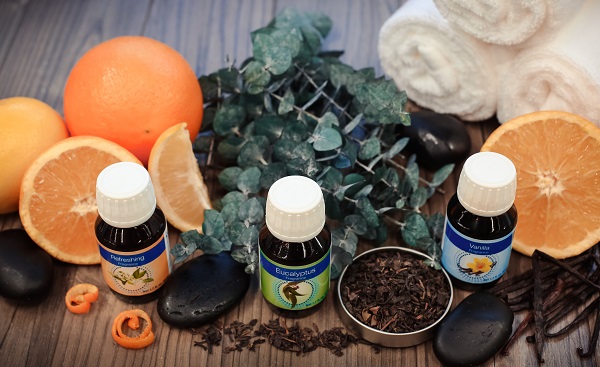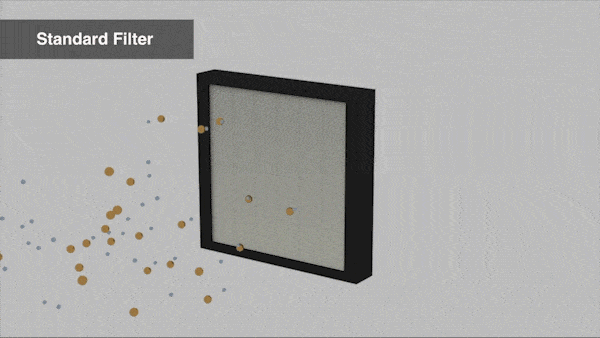Indoor air can be more polluted than outdoor air. Much of this comes from concentrated levels of volatile organic compounds, or VOCs.
The term VOC gets thrown around quite a bit, but what does it exactly mean? VOCs are volatile organic compounds. This ultimately refers to the chemicals and gases that common household items like candles, furniture, and cleaning supplies emit into your indoor air.
VOCs are typically found in concentrated levels indoors, which is why indoor air can be so much more polluted than outdoor air. While concentrations can vary, it is important to be aware of the potential dangers everyday items in your home or office can have on your health. Some of the most common forms of volatile organic compounds include benzene, formaldehyde, and toluene.
VOCs in Your Home and Office

Exposure to VOCs typically happens through inhalation. When your air quality is compromised from harmful pollutants, concentration and productivity levels can decrease, and your respiratory health can deteriorate. Some of the most common sources of volatile organic compounds can be found in the following items in both home and office environments:
- Paints, paint strippers, and other solvents
- Wood preservatives, varnishes, and finishes
- Aerosol sprays
- Cleansers and disinfectants
- Moth repellents and air fresheners
- Stored fuels and automotive products
- Hobby supplies, including graphics and craft materials including glues and adhesives, permanent markers, and photographic solutions
- Dry-cleaned clothing
- Cosmetics and deodorants
- Pesticide
- Building materials and furnishings
- Flooring, carpet, pressed wood products
- Office equipment such as copiers and printers, correction fluids and carbonless copy paper
- Wood burning stoves and other burning items like candles
- Tobacco smoke
Health Effects

According to the American Lung Association, some VOCs are harmful by themselves. Some have been linked to causing cancer and when combined with air pollution, they can be particularly dangerous to breathe. The health effects of VOCs exposure can be broken down into short term and long term symptoms:
Short term:
- Eye and respiratory tract irritation
- Headaches
- Dizziness
- Visual disorders
- Nausea
Long term:
- Damage to the liver, kidneys, and central nervous system
- Cancer
- Extensive irritation to the eyes, nose, and throat
- Chronic fatigue
- Loss of coordination
- Memory loss
How VOCs affect a person’s health varies greatly upon exposure time, levels, and if the individual is already at risk for other health issues. For asthmatics or people who already have sensitivities to certain chemicals, symptoms may be more acute. Always contact your doctor if you have questions regarding a certain reaction to a suspected chemical.
Reducing VOCs in Your Home or Office

The best way to reduce your exposure to VOCs in your home or office is by avoiding or limiting the use of products with high levels of volatile organic compounds. It is important to be informed on what products can produce these airborne chemicals. Find the sources and remove or limit the use of that item.
Items that are used and then stored can be dangerous as they are likely to release VOCs into the air. Storing unused chemicals and paints in an area where you spend less time, like a garage or storage unit. Disposing of unused chemicals that are stored for long periods of time is also another beneficial way to reduce exposure. Check with your city or county for appropriate disposal instructions.
Purchase low-VOC options of paints, adhesives, furnishings, etc., or purchase alternatives. For the Venta 5 Series Humidifiers, Venta offers a line of essential oil Aromatherapy, used in conjunction with the humidifier units to release pleasing fragrances into your indoor environment. This is a safe alternative to burning candles, which is a common source of VOCs. Candles contain paraffin, a petroleum byproduct, which when burned, emit many chemicals including acetone, benzene, and toluene, which are known carcinogens.

Proper room ventilation and air quality management are critical ways to reduce your exposure to volatile organic compounds. Filter out VOCs with a powerful air filter, like the Venta LP60 Air Purifier. This unit features two filters, called the VENTAcel Nelior Filter.
The advanced filter technology of the VENTAcel Nelior Filter removes indoor air pollutants such as pollen, mold spores, pet dander, dust mites, bacteria, viruses, and other indoor air irritants down to 0.07 microns with a total filtration capacity of more than 99.95%. Composed of a particle-arresting microscopic fiber lattice, the Nelior technology results in lower operating pressure differential and the highest filtration efficiency. This performance is unsurpassed by all other HEPA and ULPA filters currently available on the market.

Additionally, the VENTAcarb Filter, an activated carbon filter, can also be efficient in eliminating airborne pollutants in the form of gasses and smoke. Designed to be used in conjunction with the VENTAcel Nelior Filter, the VENTAcarb Filter features a large inner surface area that generates an enormous adsorption capacity for gaseous components, including many volatile organic compounds. Both of these filters are compatible with the air purifier models from Venta, suitable for home and office use.
How are you maintaining healthy indoor air quality? If you are looking for healthy indoor air tips and the latest news on Venta news and promotions, sign up for our newsletter here.
**The contents of the Venta blog are intended for informational purposes and are not intended to replace the advice of health and medical professionals. Always refer to your physician or other qualified healthcare professional for questions or concerns you may have about your health and wellness.

